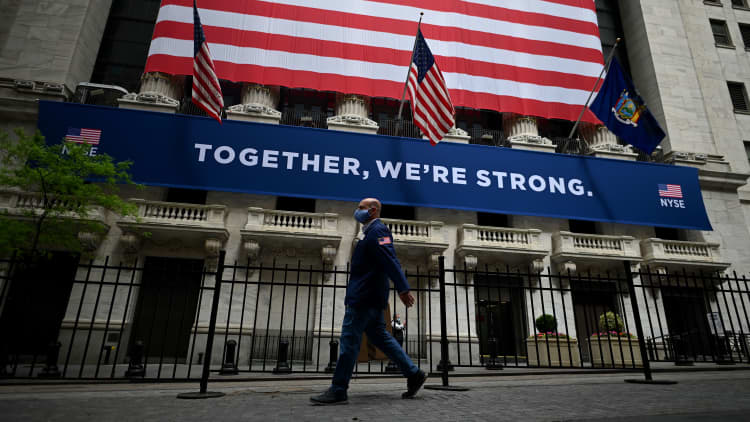U.S. stocks have had a wild week, but a notable one. On Monday, the S&P 500 recovered its 2020 losses, while on Wednesday, the technology-heavy Nasdaq Composite closed above 10,000 for the first time, and the Dow Jones Industrial Average also logged gains before dropping back down during Thursday morning trading.
But these market swings came as officials declared that the U.S. entered a recession in February. While experts generally define a recession as a period of significant decline in GDP in back-to-back financial quarters, the private non-profit research organization National Bureau of Economic Research said Monday that the "unprecedented magnitude of the decline in employment and production, and its broad reach across the entire economy, warrants the designation of this episode as a recession, even if it turns out to be briefer than earlier contractions."
So if we're in a recession, aka an economic downturn, why is the stock market spiking? The stock market tends to be what's referred to as a leading indicator of the economy. It's not a direct, parallel representation of the economy, but it can give a preview of where things may be heading. "Typically the market will start declining before a recession is visible and it will start recovering about four months before the end of a recession," Jurrien Timmer, director of global macro at Fidelity Investments, tells CNBC Make It.
In other words, that means while the market reflects the economy, its performance typically moves ahead of it, Timmer says. That's why stocks have looked so disconnected from the economic fundamentals such GDP, employment and inflation. The stock market started to drop off in February, but experts say we didn't hit peak unemployment until May.
In fact, the stock market has a decent track record of "sniffing out" when the economic situation has stopped getting worse, says Liz Ann Sonders, Schwab's chief investment strategist. But it's not perfect, and we're in uncharted territory during this coronavirus-induced recession.
"We've never had a full-stop economic shutdown by government mandate ever in history," Sonders says, so we can't go back and look at the last four times a global pandemic shut down the global economy to see how long the resulting recession lasted.
And those unknowns have led to some wild market spikes. "We went from an all time high on February 19 to down 35% on March 23 at a record clip, the fastest move from an all-time high to bear market territory in history," Sonders says. "But the speed with which the rebound happened is unlike anything we've seen before."
What's ahead for the markets
In this case, Sonders says she believes the recent stock market rallies have more to do with the hope by investors that the U.S. will undergo a "V-shaped" recovery where the country's GDP takes a sharp and rapid downturn followed by a violent upswing. But the upswings are also driven by the liquidity that the Federal Reserve and income replacement programs like boosting unemployment and sending stimulus checks that lawmakers have provided.
Think about it like a crevice in between two mountains, Sonders says. One side is going straight down and the other is coming straight back up. "The market is sort of betting that between the Fed and Congress, they basically filled in the crevice, so all we really have to do is sort of hop over without sinking down."
But now the big question remains: Is the market right? Sonders says there's still "significant risk" that the market's positive outlook isn't pricing in all the ripple effects of the pandemic. "There are long term impacts on the economy that we don't know yet, and we haven't digested yet."
One potentially overlooked area: permanent unemployment. While May's job report found that unemployment was down from the April high, the number of permanent job losses rose, a sign that some businesses may have shut down for good. And bankruptcies are going up, Sonders says, noting that several major retailers, such as J.Crew, J.C.Penney and Neiman Marcus, have already filed for bankruptcy. "In the event of an actual bankruptcy, many of those perceived temporary job losses become permanent layoffs."
"There are so many things to think about in terms of how our economy operates under what appear to be significant changes that are unfolding. And that, I think, is the kind of rude awakening maybe that the market has ahead of itself," Sonders says.
Check out: The best credit cards of 2020 could earn you over $1,000 in 5 years
Don't miss: Don't let market upswings fool you into believing economic recovery is here



